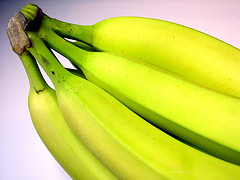Calories in a banana

The banana has become an everyday fruit and is easy to carry, easy to peel and easy to eat. In other words a perfect snack for those in a hurry. The taste and texture makes it particularly good as an alternative to cookies and candy when it's time for a snack break. Bananas are also very suitable for cooking. The mild, sweet flavor makes it a great supplement in hot, spicy meals, especially if they contain curry.
There are relatively quite a lot of calories in a banana so it gives you an instant energy boost when you are in need of one. Compared to other fruits bananas do contain an unusual lot of energy, but the banana calories come mainly from carbohydrates, i.e. starch and sugars. Lots of people think the calories in banana come from loads of fat, but that is completely wrong. Therefore, if you want to reduce your fat intake to easier maintain a healthy body weight, bananas are an excellent choice to lower the desire to eat fat food or sweets. A banana is easy to chew and easy to digest which means it quickly raises the blood sugar level and reduces the desire for cookies or chocolate.
So what is the number of calories in a banana? An average banana (105g) contains only 100 calories, compared with 550 calories in a 100g chocolate bar, or 170 calories in a pastry (40g). Also, almost zero of the banana calories come from fat whereas half of the calories in the chocolate bar and pastry come from fat. Athletes who workout and compete a lot have long ago discovered the benefits from eating bananas and absorbing the banana calories. Immediately after a workout it's important to refuel the muscles by eating food that contains a lot of carbs that increases blood sugar levels quickly. Which is precisely what a banana does! A small word of warning though - food with this quality is not recommended if you have diabetes and have to closely regulate your blood sugar level. Be cautious with bananas if you are a diabetic.
Potassium
The banana is also known for its high potassium content. All fruits and vegetables contain a lot of potassium but bananas are among the best. A banana (105g) contains 13% of the recommended daily intake for women and 8% for men. Potassium is a mineral that we need quite a lot of, about 3 grams a day. It has an important function in the blood pressure regulation system and is needed for muscles and nerves to function properly. Several major studies point to the fact that a low potassium intake conduces a high blood pressure. If you want to keep your blood pressure on a normal and healthy level throughout your life, or lower it, a great dietary advice is to eat plenty of fruit, especially bananas, and vegetables.
Magnesium
Perhaps less known is the fact that bananas contain quite a lot of magnesium. A banana (105g) contains 12% of the recommended daily intake for women and 10% for men. Magnesium is involved in most of the energy producing processes in your body and is just as potassium vital for muscles and nerves to function properly. Research show a high enough intake of magnesium is important to prevent cardiovascular diseases and brittle-bone disease. Other areas where magnesium seems to have importance are the origin of and cure for migraine and endurance and performance during physical exercise.
Vitamins
Bananas contain particularly much of vitamin B-6, or pyrixodine as it is also called. A woman gets half of the recommended daily intake through a single banana, and a man gets 40%. Vitamin B-6 is involved in the requisition of protein. It makes sure that amino acids, the building blocks of protein, can transmute to other amino acids and energy. It also plays a significant part in the protection against cardiovascular diseases. Research has shown that increased levels of the amino acid homocysteine increases the risk for heart attacks and stroke. Three kinds of B-vitamins is needed to keep the level of homocystein low and healthy: B-6, B-12 and folic acid.
So next time you feel the urge for something small to eat, eat a banana! Make it a habit and your body will thank you and keep you healthier.
Photo by PPDIGITAL
